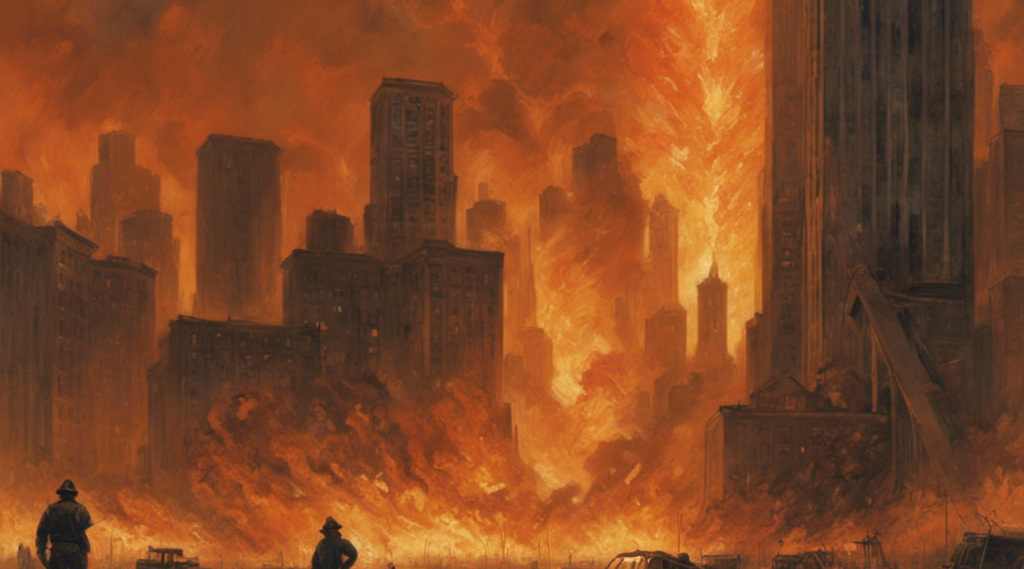
Chapter 1 What’s the Book Meltdown about
The book titled "Meltdown: Why Our Systems Fail and What We Can Do About It" is written by Chris Clearfield and András Tilcsik. It explores the reasons behind catastrophic failures in various complex systems such as finance, healthcare, technology, and more. The authors delve into the underlying causes of these failures, highlighting how seemingly small issues can escalate into large-scale disasters.
The book emphasizes the importance of understanding and managing complexity to prevent such meltdowns. It discusses the concept of "tight coupling," where interdependencies between components within a system make it vulnerable to failure. By examining real-life examples like the Deepwater Horizon oil spill and the global financial crisis, the authors explain how tightly coupled systems can lead to unexpected consequences.
Clearfield and Tilcsik also explore strategies for improving system resilience and reducing the likelihood of meltdowns. They suggest adopting practices such as building redundancy, encouraging transparency, promoting diversity of perspectives, and creating feedback loops for continuous improvement.
Overall, "Meltdown" offers valuable insights into the nature of complex systems and provides practical recommendations for individuals, organizations, and policymakers to avoid catastrophic failures and mitigate their impact.
Chapter 2 Is Meltdown Valued
According to reddit comments on Meltdown, "Meltdown: Why Our Systems Fail and What We Can Do About It" is a highly regarded book that delves into the reasons behind system failures and offers potential solutions. The value of the book lies in its comprehensive analysis of various fields, including engineering, psychology, and organizational behavior, to explain how complex systems can fail catastrophically.
The author, Chris Clearfield, along with co-author András Tilcsik, provides compelling case studies and real-world examples to illustrate their arguments. By examining incidents such as the Deepwater Horizon oil spill and the financial crisis of 2008, they highlight the interconnectedness of these complex systems and the inherent risks involved.
This book is particularly valuable for professionals working in high-stakes industries such as aerospace, medicine, finance, and technology. It offers insights into the factors contributing to system failures, including human error, cognitive biases, and organizational shortcomings. Furthermore, it proposes practical strategies to mitigate these risks and improve system resilience.
Overall, "Meltdown" is highly valued for its thought-provoking analysis, practical recommendations, and engaging storytelling. It serves as an important resource for anyone interested in understanding and addressing the vulnerabilities of complex systems.
Chapter 3 Meltdown Review
In this article, we delve into the thought-provoking book "Meltdown: Why Our Systems Fail and What We Can Do About It." By examining the failures present in our complex systems, the author sheds light on the vulnerabilities that can lead to catastrophic outcomes. Through a comprehensive analysis, the book offers valuable insights into the root causes behind these meltdowns, exploring potential solutions that can help prevent such failures in the future. Join us as we uncover the intriguing concepts presented in "Meltdown" and discuss how they can reshape our approach towards system design and management.

Chapter 4 Author of Meltdown
The book "Meltdown: Why Our Systems Fail and What We Can Do About It" is written by Chris Clearfield and András Tilcsik. It was first published on February 6, 2018.
Chris Clearfield and András Tilcsik have co-authored this book, examining the underlying causes of system failures in various domains such as finance, technology, natural disasters, and more. They explore how complex systems can break down and offer insights into preventing future failures.
Regarding other books written by Chris Clearfield, he has not authored any other books to date. However, it's worth noting that he has contributed to several articles and essays on topics related to complexity, risk management, and resilience.
As for András Tilcsik, he has not released any additional books either, but he has published numerous research papers and articles on organizational behavior, including topics such as corporate misconduct, decision-making, and workplace diversity.
Since "Meltdown" is the only book authored by both Chris Clearfield and András Tilcsik, there are no editions to compare in terms of their works together.
Chapter 5 Meltdown Meaning & Theme
1. What does the Book Meltdown Mean
"Meltdown: Why Our Systems Fail and What We Can Do About It" is a book that explores the causes and consequences of system failures in various domains, such as technology, economics, healthcare, and more. The author examines the root causes of these failures and proposes strategies to prevent or mitigate them.
The title "Meltdown" suggests a catastrophic breakdown or collapse, emphasizing the gravity of system failures. The book delves into the underlying reasons behind such meltdowns, including organizational issues, human error, design flaws, and complex interactions between different components.
The book also offers insights into possible solutions and preventive measures to avoid future failures. It may discuss topics like improved system design, redundancy, risk management, effective communication, and learning from past mistakes.
Overall, "Meltdown: Why Our Systems Fail and What We Can Do About It" aims to shed light on the challenges and complexities of modern systems, providing valuable lessons and actionable recommendations to address system failures across various industries.
2. Meltdown Theme
The theme of the book "Meltdown: Why Our Systems Fail and What We Can Do About It" revolves around understanding the causes and consequences of system failures and exploring ways to mitigate such failures. The book delves into various domains, including engineering, finance, healthcare, and transportation, to uncover the underlying reasons behind catastrophic incidents and how they can be prevented in the future.
One key aspect of the book is the examination of complex systems and their inherent vulnerabilities. By studying notable disasters like the Deepwater Horizon oil spill, the Global Financial Crisis, and the Fukushima nuclear accident, the author emphasizes that failures rarely stem from isolated incidents or individual errors. Rather, they often result from a combination of intricate factors and systemic weaknesses.
The concept of "normal accidents" is another crucial theme explored in the book. This notion suggests that certain types of systems are inherently susceptible to failures due to their complexity and the potential for unforeseen interactions among components. Understanding this idea helps readers appreciate the importance of proactive measures to detect and address problems before they escalate into major crises.
The book also highlights the significance of organizational culture, human factors, and decision-making processes in preventing failures. It points out that even with advanced technology and robust designs, the potential for errors remains if there are deficiencies in communication, collaboration, training, and the management of resources.
Ultimately, the overarching message conveyed by the author is the need for a holistic approach to system safety. By acknowledging the inevitability of failures and adopting strategies that emphasize resilience, redundancy, adaptability, and continuous learning, individuals and organizations can mitigate the impact of failures and enhance the overall reliability of complex systems.

Chapter 6 Examining Digital Content about Meltdown
If you're in search of a diverse range of book formats and concise summaries on the topic of Meltdown, we suggest exploring platforms like Bookey. They boast an extensive collection of books available in various formats, accompanied by short summaries that give a quick glimpse into each book's content. This is particularly advantageous for individuals seeking a comprehensive overview without investing excessive time. However, if you prefer delving into a complete book experience and enjoy holding physical copies, we highly recommend visiting Amazon. They offer an extensive selection of physical books covering Meltdown, along with complementary titles like "Meltdown: Why Our Systems Fail and What We Can Do About It Hardcover – International Edition, March 20, 2018" that provide deeper insights and informative content. Regrettably, we are unable to provide a direct PDF version of Meltdown within this post, as our main goal is to present the book's value and offer alternative reading options.
We wish you joyful reading adventures!
Chapter 7 Quotes from Meltdown
Meltdown quotes as follow:
- "Failures are not isolated incidents; they are symptoms of deeper problems lurking within our systems."
- "Complexity is the enemy of reliability. The more intricate our systems become, the higher the chances of failure."
- "Blame is not a solution; understanding the root cause is. Only by analyzing failures can we learn to prevent them in the future."
- "Transparency is key in building resilient systems. Concealing information about failures only perpetuates the cycle of mistakes."
- "No system is infallible; even the most robust ones are susceptible to failure. It's crucial to accept this reality and work towards mitigating the impact."
- "Failure should be embraced as an opportunity for growth. Each incident provides valuable insights into potential weaknesses that can be addressed."
- "Resilience is not an attribute of individual components but rather emerges from the interactions between different parts of a system."
- "Prevention alone is not enough; we must also focus on detection and recovery mechanisms to minimize the impact of failures."
- "Learning from the past is essential, but we must also anticipate future challenges and adapt our systems accordingly."
- "Building reliable systems requires a culture of continuous improvement, where failure is not seen as a setback but as a stepping stone towards greater resilience."
Remember, these quotes are paraphrased and may not be exact wordings from the book.
Chapter 8 Similar to Meltdown
If you're looking for books similar to "Meltdown," which is a book by Chris Clearfield and András Tilcsik about catastrophic failures and their underlying causes, here are some recommendations that explore similar themes of systems failure, risk management, and human error:
- "The Black Swan: The Impact of the Highly Improbable" by Nassim Nicholas Taleb: This book discusses the concept of highly improbable events with severe consequences, known as "Black Swans," and how they challenge our ability to predict the future.
- "Normal Accidents: Living with High-Risk Technologies" by Charles Perrow: Perrow explores accidents in complex systems and argues that they are inevitable due to the inherent vulnerabilities within these systems.
- "The Challenger Launch Decision: Risky Technology, Culture, and Deviance at NASA" by Diane Vaughan: This book examines the decision-making process that led to the Challenger Space Shuttle disaster and provides insights into organizational culture, risk assessment, and management.
- "The Unthinkable: Who Survives When Disaster Strikes - And Why" by Amanda Ripley: Ripley explores human responses to disasters and examines why certain individuals and communities fare better than others in dire situations.
- "Deep Survival: Who Lives, Who Dies, and Why" by Laurence Gonzales: This book delves into the psychology and physiology of survival, exploring case studies of people who have faced life-threatening situations and examining the factors that contribute to their survival or demise.
- "Collapse: How Societies Choose to Fail or Succeed" by Jared Diamond: Diamond investigates the collapse of past civilizations and draws lessons for our modern societies, exploring themes of environmental degradation, social structures, and individual decisions.
- "The Big Short: Inside the Doomsday Machine" by Michael Lewis: This book explores the 2008 financial crisis and uncovers the individuals who saw it coming and profited from it. It provides an in-depth analysis of the events leading up to the meltdown and exposes the flaws in the financial system.
These books should provide you with further insights into various aspects of system failures, risk management, and human behavior in high-stakes situations, complementing the themes explored in "Meltdown."